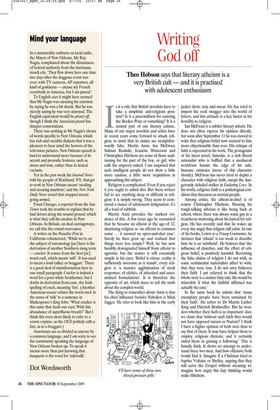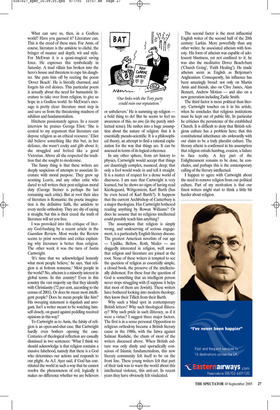Writing God off
Theo Hobson says that literary atheism is a very British cult — and it is practised with adolescent enthusiasm Is it a rule that British novelists have to take a simplistic anti-religious position? Is it a precondition for entering the Booker Prize or something? It is a central part of our literary culture. Many of our major novelists and critics have in recent years come forward to attack religion; to insist that its claims are straightforwardly false. Martin Amis, Ian McEwan, Salman Rushdie, Jeanette Winterson and Christopher Hitchens are some of those auditioning for the part of the boy, or girl, who calls the emperor naked. I am surprised that such intelligent people do not show a little more caution, a little more trepidation in approaching this subject.
Religion is complicated. Even if you reject it you ought to admit this. But these writers fail to see anything deep or difficult in religion: it is simply wrong. They seem to commend a stance of adolescent indignation: it’s all a load of rubbish.
Martin Amis provides the starkest evidence of this. A few years ago he recounted that he became an atheist at the age of 12, dismissing religion as ‘an affront to common sense ... it seemed an open-and-shut case’. Surely he then grew up and realised that things were less simple? Well, he has now humbly downgraded himself from atheist to agnostic, but the matter is still essentially simple in his eyes: ‘Belief is otiose; reality is sufficiently awesome as it stands’, every religion is ‘a massive agglutination of stock responses, of clichés, of inherited and unexamined formulations’. It is therefore the opposite of art, which dares to tell the truth about the complex world.
The thing to remember about Amis is that his chief influence besides Nabokov is Mick Jagger. He tries to look like him in the early jacket shots: sexy and mean. He has tried to import the rock swagger into the world of letters, and this attitude is a key factor in his hostility to religion.
Ian McEwan is a subtler literary atheist. He does not often express his opinion directly, but soon after September 11 he was moved to write that religious belief now seemed to him more objectionable than ever. His critique of faith is expressed in his work. The protagonist of his latest novel, Saturday, is a rich liberal rationalist who is baffled that a mediaeval worldview haunts the edge of his safe, humane existence (more of this character shortly). McEwan has never tried to depict a character with religious faith, except the dangerously deluded stalker in Enduring Love. In his world, religious faith is a pathological condition that threatens us normal people.
Among critics, the atheist-in-chief is of course Christopher Hitchens. Hearing his tough-talking atheism is like being back at school, where there was always some guy in a trenchcoat muttering about his hatred for religion. He has recently said that he wakes up every day angry that religion still exists. In one of his books, Letters to a Young Contrarian, he declares that ‘atheist’ is too weak to describe him: he is an ‘antitheist’. He believes that ‘the influence of churches, and the effect of religious belief, is positively harmful. Reviewing the false claims of religion I do not wish, as some sentimental materialists affect to wish, that they were true. I do not envy believers their faith. I am relieved to think that the whole story is a sinister fairy tale; life would be miserable if what the faithful affirmed was actually the case.’ In the same book he admits that ‘many exemplary people have been sustained by their faith’. He refers to Dr Martin Luther King and Dietrich Bonhoeffer. But he wonders whether their faith is so important: dare we claim that ‘without such faith they would not have opposed racism or Nazism? I think I have a higher opinion of both men than to say that of them. It may have helped them to employ religious rhetoric, and it certainly aided them in gaining a following.’ This is funnily thick. It shows no attempt to understand these two men. And how offensive both would find it. Imagine if a Christian tried to baptise Voltaire or Shelley, arguing that they still serve the Gospel without meaning to; imagine how angry this lazy thinking would make Hitchens. What can save us, then, in a Godless world? Have you guessed it? Literature can. This is the creed of these men. For Amis, of course, literature is the antidote to cliché, the bringer of nuance and depth, wit and style. For McEwan it is a quasi-magical saving force. He expresses this symbolically in Saturday. A mad villain has broken into the hero’s house and threatens to rape his daughter. She puts him off by reciting the poem ‘Dover Beach’. He is literally charmed, and forgets his evil desires. This particular poem is actually about the need for humanistic literature to take over from religion, to give us hope in a Godless world. So McEwan’s message is pretty clear: literature must step in and save us from the threatening madness of nihilism and fundamentalism.
Hitchens passionately agrees. In a recent interview he praises George Eliot: ‘She is central to my argument that literature can depose religion as an ethical resource.’ Eliot did believe something like this but, in her defence, she wasn’t cocky and glib about it; she struggled and fretted like a good Victorian. Above all she respected the tradition that she sought to modernise.
The funny thing is that these writers are deeply suspicious of attempts to associate literature with moral purpose. They grew up scorning Leavis, and any other critic who dared to tell writers their post-religious moral duty (George Steiner is perhaps the last remaining such critic). But at root their idea of literature is Romantic: the poetic imagination is the definitive faith, the antidote to every sterile orthodoxy. They are shy of saying it straight, but this is their creed: the truth of literature will set you free.
I was provoked into this critique of literary God-bashing by a recent article in the Guardian Review. Most weeks the Review seems to print novelists and critics explaining why literature is better than religion. The other week it was the turn of Justin Cartwright.
‘It’s time that we acknowledged honestly what most people believe,’ he says, ‘that religion is at bottom nonsense.’ Most people in the world? No, atheism is a minority interest in global terms. In this country? Even in this country the vast majority say that they identify with Christianity (72 per cent, according to the census of 2001). Or does he mean most intelligent people? Does he mean people like him? His sweeping statement is slapdash and arrogant. Isn’t a writer meant to be watching himself closely, on guard against peddling received opinions in this way?
To Cartwright as to Amis, the falsity of religion is an open-and-shut case. But Cartwright hardly even bothers opening the case. Centuries of theological reflection are casually dismissed in two sentences: ‘What I think we should acknowledge is that religion contains a massive falsehood, namely that there is a God who determines our actions and responds to our plight. As A.J. Ayer said, if God has constituted the world in such a way that he cannot resolve the phenomenon of evil, logically it makes no difference whether we are believers or unbelievers.’ He is summing up religion a bold thing to do! But he seems to feel no awareness of this, no awe (in the purely intellectual sense). He rushes into a huge assumption about the nature of religion: that it is essentially pseudo-scientific. It is a philosophical theory, an attempt to find a rational explanation for the way that things are. It can be assessed in terms of its logical coherence.
In any other sphere, from art history to physics, Cartwright would accept that things are dauntingly complex, nuanced, deep; that only a fool would wade in and tell it straight. It is a matter of respect for a dense world of discourse. I am sure that Cartwright is very learned, but he shows no signs of having read Kierkegaard, Wittgenstein, Karl Barth (has he even heard of Karl Barth?). It happens that the current Archbishop of Canterbury is a major theologian. Has Cartwright bothered reading anything by Rowan Williams? Or does he assume that no religious intellectual could possibly teach him anything?
The assumption that religion is simply wrong, and undeserving of serious engagement, is a particularly English literary disease. The greatest American novelists of our age — Updike, Bellow, Roth, Mailer — are doggedly interested in religion, well aware that religion and literature are joined at the root. None of these writers is tempted to see the question of religion as essentially simple, a closed book, the preserve of the intellectually dishonest. For these four the question of God is something that an intelligent person never stops struggling with (I suppose it helps that most of them are Jewish). These writers have bothered looking into modern theology; they know their Tillich from their Barth.
Why such a blind spot in contemporary British letters? Why such theological illiteracy? Why such pride in such illiteracy, as if it were a virtue? I suggest three major factors. The first is in a sense personal. Opposition to religious orthodoxy became a British literary cause in the 1980s, with the fatwa against Salman Rushdie, the chum of most of the writers discussed above. When British culture was only dimly and sporadically conscious of Islamic fundamentalism, this new literary community felt itself to be on the front line. These young writers felt that part of their task was to warn the world about this intellectual violence, this anti-art. In recent years they have obviously felt vindicated. The second factor is the most influential English writer of the second half of the 20th century: Larkin. More powerfully than any other writer, he associated atheism with honesty. His form of atheism was capable of adolescent bluntness, yet not confined to it; he was also the meditative Dover Beach-bum (‘Church Going’, ‘Faith Healing’). He made atheism seem as English as Betjeman’s Anglicanism. Consequently, his influence has been amazingly broad: not only on Martin Amis and friends, also on Clive James, Alan Bennett, Andrew Motion — and also on a new generation including Zadie Smith.
The third factor is more political than literary. Cartwright touches on it in his article, when he concludes that religious institutions must be kept out of public life. In particular he criticises the persistence of the established Church. It is difficult to deny that British religious culture has a problem here; that this constitutional inheritance sits awkwardly with our claim to be a truly pluralist culture. The literary atheist is confirmed in his assumption that religion entails humbug, evasion, a failure to face reality. A key part of the Enlightenment remains to be done, he concludes, and perhaps this is the contemporary calling of the literary intellectual.
I happen to agree with Cartwright about the need to remove religion from our political culture. Part of my motivation is that our finest writers might start to think a little bit harder about religion.

























































 Previous page
Previous page